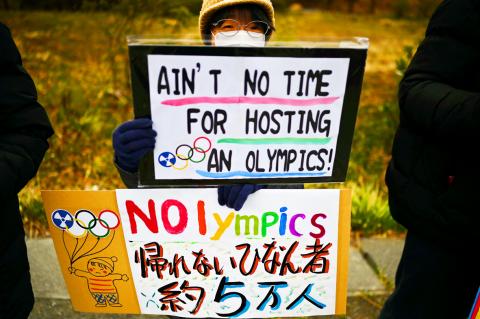Japan has lifted an evacuation order for parts of a town in the shadow of the wrecked Fukushima Dai-ichi nuclear power plant, weeks before the area is to host the start of the Olympic torch relay.
Futaba, 4km west of the plant, has been almost deserted since the nuclear meltdown nine years ago, while other areas in the region have mounted a partial recovery after the Japanese government declared them safe for residents.
The start of the relay’s Japan leg at the end of the month is supposed to showcase Fukushima Prefecture’s recovery from the world’s worst nuclear accident since Chernobyl in 1986, but some residents say their hometowns might never return to normal.

Photo: Reuters
Futaba’s 7,000 residents were forced the evacuate after the March 2011 disaster, triggered by a powerful earthquake and tsunami that killed more than 18,000 people along Japan’s northeast coast and destroyed the plant’s backup power supply.
The reopening of about a 4km2 area of Futaba means reconstruction workers can stay in accommodation near the railway station, but residents would not be able to return for another two years, after its water supply and other infrastructure have been restored, local officials said.
They would be able to enter and leave for short visits without going through security, and would no longer need to wear protective clothing, but would not be allowed to stay overnight, they said.

Photo: AFP
While the COVID-19 outbreak has prompted speculation that the Tokyo Olympics could be canceled or postponed, the Japanese government is keen to promote the Games as proof that the region, including Fukushima, has recovered from the disaster.
“I’m overwhelmed with emotion as we finally bring part of our town operations back to our hometown,” Futaba Mayor Shiro Izawa said. “I pledge to push forward with our recovery and reconstruction.”
The Japanese leg of the torch relay is due to begin on March 26 at J-Village — a soccer training complex that functioned for years as a logistics hub for crews working to control and decommission the damaged nuclear power plant 19km away.
Although organizers have said the route is subject to change, the torch is scheduled to pass through Futaba later the same day, before being taken through other parts of Fukushima Prefecture over the following two days.
“In addition to building excitement across the country ahead of the Tokyo 2020 Games and promoting the Olympic values, the Olympic torch relay aims to demonstrate solidarity with the regions still recovering from the 2011 earthquake and tsunami,” the organizers said last month.
More than 160,000 people were forced to flee their homes following the Fukushima Dai-ichi meltdown. Many have decided not to return, despite government reassurances on safety, and many of those who have are elderly residents.
Futaba is no exception, with just 10 percent of residents saying they intend to return. Some, particularly those with young children, are concerned about radiation levels, while others have built new lives elsewhere.
Futaba resident Yuji Onuma said work to repair streets and decontaminate the town center was designed to give the world a false impression before the Olympic torch relay.
“I wish they wouldn’t hold the relay here,” Onuma said.
Pointing at workers repaving a road expected to be on the relay route, he added: “Their No. 1 aim is to show people how much we’ve recovered. I don’t think people will understand anything by just seeing cleaned-up tracts of land.”
Radiation readings taken last month near Futaba Railway Station were about 0.28 microsieverts per hour, higher than the government-set target of 0.23 microsieverts per hour.
Another part of the town had a reading of 4.64 microsieverts per hour on the same day, meaning a person would reach the annual exposure limit of 1 millisievert, recommended by the International Commission on Radiological Protection, in just nine days.
The torch is due to pass through the village of Iitate the following day, but campaigners this week described the relay as inappropriate and warned that they had found radiation “hotspots” in the village.
In a survey of 69 locations along and around the proposed relay route, the Radioactivity Monitoring Center for Citizens group said that it had found 44 sites with radioactive levels above 0.23 microsieverts per hour, including one “severe hotspot” of 0.85 microsieverts per hour.
The discovery of hotspots near J-Village by Greenpeace Japan at the end of last year prompted the Japanese Ministry of the Environment and the plant’s operator, Tokyo Electric Power Co, to perform extra decontamination work.
While some independent monitors have said the discovery of isolated hotspots does not present an accurate picture of the overall situation in Fukushima Prefecture, Nobuyoshi Ito, an Iitate farmer, said the civic group’s findings cast doubts on government claims that decontamination work had been a success.
“Radiation exposure for runners passing along the route may not be very high, but the overall situation in places like Iitate is severe,” Ito said. “Levels are several times to as many as 20 times higher in the village than they were before the disaster, and people who moved back have to put up with that 24 hours a day, 365 days a year.”
Of Iitate’s pre-2011 population of 6,100, only 1,200 people have returned, Ito said.
“The small number of people coming means that the nuclear disaster is not over yet. The truth is that full recovery from a nuclear disaster like this is just not possible,” he said.
Additional reporting by agencies

ANGER: A video shared online showed residents in a neighborhood confronting the national security minister, attempting to drag her toward floodwaters Argentina’s port city of Bahia Blanca has been “destroyed” after being pummeled by a year’s worth of rain in a matter of hours, killing 13 and driving hundreds from their homes, authorities said on Saturday. Two young girls — reportedly aged four and one — were missing after possibly being swept away by floodwaters in the wake of Friday’s storm. The deluge left hospital rooms underwater, turned neighborhoods into islands and cut electricity to swaths of the city. Argentine Minister of National Security Patricia Bullrich said Bahia Blanca was “destroyed.” The death toll rose to 13 on Saturday, up from 10 on Friday, authorities

DEBT BREAK: Friedrich Merz has vowed to do ‘whatever it takes’ to free up more money for defense and infrastructure at a time of growing geopolitical uncertainty Germany’s likely next leader Friedrich Merz was set yesterday to defend his unprecedented plans to massively ramp up defense and infrastructure spending in the Bundestag as lawmakers begin debating the proposals. Merz unveiled the plans last week, vowing his center-right Christian Democratic Union (CDU)/Christian Social Union (CSU) bloc and the center-left Social Democratic Party (SPD) — in talks to form a coalition after last month’s elections — would quickly push them through before the end of the current legislature. Fraying Europe-US ties under US President Donald Trump have fueled calls for Germany, long dependent on the US security umbrella, to quickly

Local officials from Russia’s ruling party have caused controversy by presenting mothers of soldiers killed in Ukraine with gifts of meat grinders, an appliance widely used to describe Russia’s brutal tactics on the front line. The United Russia party in the northern Murmansk region posted photographs on social media showing officials smiling as they visited bereaved mothers with gifts of flowers and boxed meat grinders for International Women’s Day on Saturday, which is widely celebrated in Russia. The post included a message thanking the “dear moms” for their “strength of spirit and the love you put into bringing up your sons.” It

In front of a secluded temple in southwestern China, Duan Ruru skillfully executes a series of chops and strikes, practicing kung fu techniques she has spent a decade mastering. Chinese martial arts have long been considered a male-dominated sphere, but a cohort of Generation Z women like Duan is challenging that assumption and generating publicity for their particular school of kung fu. “Since I was little, I’ve had a love for martial arts... I thought that girls learning martial arts was super swaggy,” Duan, 23, said. The ancient Emei school where she trains in the mountains of China’s Sichuan Province